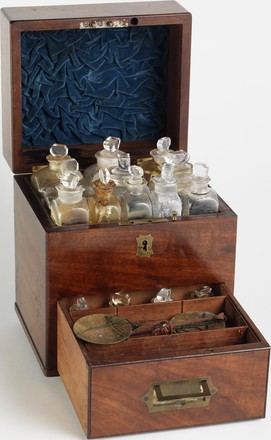
Travelling medicine chest belonging to the Macquarie family, c. 1820
R 2129
Mahogany medicine chest with crushed velvet lining and brass fittings filled with glass apothecary bottles
Mahogany medicine chest with crushed velvet lining and brass fittings filled with glass apothecary bottles
This medicine chest is an example of nineteenth century campaign furniture, which was used by gentlemen travellers and army officers. This form of portable furniture meant that the men did not have to leave their home comforts behind as they travelled or marched across continents. It is hard to ascertain for certain whether this medical chest belonged to Lachlan Macquarie senior – who died in 1824 – or Lachlan Macquarie junior. It may have been passed down from father to son.


 Back to list
Back to list